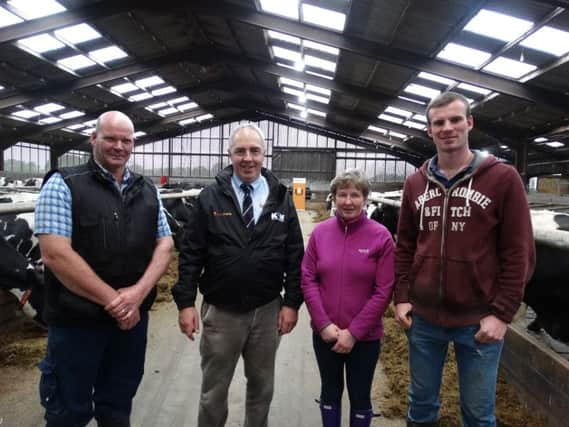Robotic milking requires a bespoke nutritional solution


During a recent Lely open day on the farm John was quick to point out that the robotic approach to milking has helped secure the attainment of two landmark goals for the farm business.
“The first of these is getting the herd through the 10,000L production barrier,” he said.
Advertisement
Advertisement
“But the second is much more fundamental and, in a way, it gets to the very heart of what robotic milking is all about: the robots allow us to think more strategically about the development of the herd. And this is crucial against a backdrop of what can be widely fluctuating milk prices.”
The Barkleys are also quick to confirm the compatibility of their robots with other related technologies.
“A case in point is automated heat detection,” said Craig.
“First off, it works. Moreover, its use has allowed us to utilise sexed semen across the herd in a more effective manner. We are now getting the replacement heifers we need from our top-end cows only.
“In turn, this allows us to use beef sires on a larger number of the other cows in the herd.
Advertisement
Advertisement
“We use AI exclusively on all breeding stock and the current calving index is sitting at 371 days.
“Prior to the robots being installed this figure was in the region of 440 days.”
United Feeds Sales Manager, Clarence Calderwood updated visitors at the Lely open Day on the feeding and performance of the herd since United Feeds got involved with the feeding during winter 2016.
The Maineside herd is currently averaging 10,200L at 4.07 per cent butterfat and 3.2 per cent protein.
Advertisement
Advertisement
“These figures prove that with the correct management and nutrition it is possible to combine high output with equally impressive constituent percentages and fertility.”
The herd is split into two milking groups: those cows in early lactation and those 150 days plus. Feeding to yield is the overall driver for the herd as a whole. Clarence takes up the story.
“Each group currently receives a mix comprising 25kg of first cut silage, 8kg of wholecrop wheat and half a kilo of nutritionally improved straw. Both groups then receive a bespoke United Feeds’ blend to give a basal TMR formulated to produce maintenance plus 26 litres of milk in the case of the ‘high group’ and 20 litres for the ‘low group’.”
Clarence pointed out that the first cut pit was opened at the beginning of October, so as to fully capitalise on the milk bonus payments available from Dale Farm during the months of October, November and December.
Advertisement
Advertisement
“This silage has a dry matter of 41%. As a consequence, water is being added to the diet feeder mix to achieve an overall TMR dry matter of 55%” he said.
“This TMR is then topped-up to yield with the nuts fed through the robot which in the case of John and Craig are Advance RP nuts. This 16% crude protein ration is extremely suitable in a robotic milking situation and amongst other additives and organic minerals it contains Amaferm®. Amaferm® is a natural feed additive that boosts the digestibility of fibre and is the only feed additive registered in the EU as a digestion enhancer for dairy cows.
“As part of the nutritional program for the Maineside Herd we are working closely with John and Craig to formulate overall rations that do not contain excessive levels of protein.
“This approach will help to ensure a flatter and more sustainable lactation curve which boosts overall cow health and fertility levels.
Advertisement
Advertisement
“The TMR blend has been specifically formulated to reflect the quality of the forages available on the farm. This is a service which we offer all our customers,” he said.
For further information on winter feeding solutions for your herd speak to your local United Feeds Adviser or customer services on 028 9075 9000.